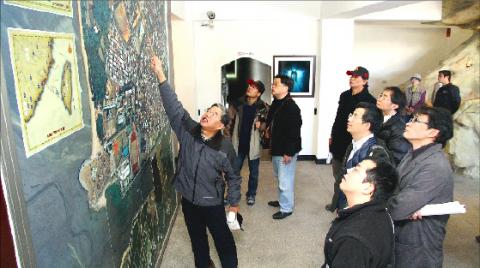An historical committee under the Kinmen County government determined on Sunday that it would list the 40-year-old Jincheng Civic Tunnel as an officially designated historic site entitled to special protection.
The Kinmen County Historic Structure Evaluation Committee, headed by Kinmen County Commissioner Li Wo-shi (李沃士), decided at a recent meeting to have the 2,559m tunnel, which was excavated in 1968, and -extensively rebuilt in 1978, -officially recognized as being of historic importance.
It is one of the most significant and longest of the 12 underground military base tunnels, built as defense installations on Kinmen since the late 1950s.

PHOTO: CNA
The tunnels bear witness to how Kinmen survived the many Chinese communist strikes against it, including extensive shelling in 1958, and how Kinmen has been transformed from a frontline anti-communist bastion into a tourist attraction in recent years.
The Jincheng Civic Tunnel was opened to the public two years ago after being refurbished.
Located in the center of downtown Jincheng, the tunnel connects Kinmen County Hall, Kinmen Bus Station, Kinmen Post Office, the Kinmen Branch of the Land Bank of Taiwan, the Chinese Nationalist Party’s (KMT) Kinmen Chapter, an elementary school and Kinmen Senior High School.
The safety of the wartime tunnel, however, has been called into question in recent months after a property developer began building a 10-story building above the underground fortification.
“We will work out measures to ensure the landowners’ rights, as well as protect the historic site,” Li said.
If designated as an official historic site, the Jincheng Civic Tunnel will be the 45th protected historic site on the island and the first tunnel to be listed, the county government’s Cultural Affairs Bureau said.

US climber Alex Honnold is to attempt to scale Taipei 101 without a rope and harness in a live Netflix special on Jan. 24, the streaming platform announced on Wednesday. Accounting for the time difference, the two-hour broadcast of Honnold’s climb, called Skyscraper Live, is to air on Jan. 23 in the US, Netflix said in a statement. Honnold, 40, was the first person ever to free solo climb the 900m El Capitan rock formation in Yosemite National Park — a feat that was recorded and later made into the 2018 documentary film Free Solo. Netflix previewed Skyscraper Live in October, after videos

Starting on Jan. 1, YouBike riders must have insurance to use the service, and a six-month trial of NT$5 coupons under certain conditions would be implemented to balance bike shortages, a joint statement from transportation departments across Taipei, New Taipei City and Taoyuan announced yesterday. The rental bike system operator said that coupons would be offered to riders to rent bikes from full stations, for riders who take out an electric-assisted bike from a full station, and for riders who return a bike to an empty station. All riders with YouBike accounts are automatically eligible for the program, and each membership account

A classified Pentagon-produced, multiyear assessment — the Overmatch brief — highlighted unreported Chinese capabilities to destroy US military assets and identified US supply chain choke points, painting a disturbing picture of waning US military might, a New York Times editorial published on Monday said. US Secretary of Defense Pete Hegseth’s comments in November last year that “we lose every time” in Pentagon-conducted war games pitting the US against China further highlighted the uncertainty about the US’ capability to intervene in the event of a Chinese invasion of Taiwan. “It shows the Pentagon’s overreliance on expensive, vulnerable weapons as adversaries field cheap, technologically

NUMBERs IMBALANCE: More than 4 million Taiwanese have visited China this year, while only about half a million Chinese have visited here Beijing has yet to respond to Taiwan’s requests for negotiation over matters related to the recovery of cross-strait tourism, the Tourism Administration said yesterday. Taiwan’s tourism authority issued the statement after Chinese-language daily the China Times reported yesterday that the government’s policy of banning group tours to China does not stop Taiwanese from visiting the country. As of October, more than 4.2 million had traveled to China this year, exceeding last year. Beijing estimated the number of Taiwanese tourists in China could reach 4.5 million this year. By contrast, only 500,000 Chinese tourists are expected in Taiwan, the report said. The report